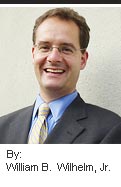|
June 2008 | Volume 11/ Number 6
Regulation Watch
Cities to VoIP Customers — Can you Spare a Buck or Two?
Under the City’s Telecommunications tax: “A tax is levied and imposed on each person who leases, licenses, or sells a telecommunications line to any customer: (1) for wired service, whose billing address or fixed service address is in the City; or (2) for wireless service, whose place of primary use is in the City.” The City argued that VoIP is subject to the tax because it “resells” telecom lines at “retail” that were purchased “wholesale” from third-party carriers, and that the City’s tax code makes no distinction between companies that physically construct their own networks and those that provide a combination of their own components with wholesale components from third-party carriers. The City also argued that several characteristics of VoIP are similar to traditional telephone providers including the fact that IP-PSTN calls rely on the partly copper portions of the network. In reaching its decision, the court noted that “[t]he issue is an extremely close one.” However, it found the City’s position to be more persuasive and ordered the VoIP provider to pay the City’s Telecommunications Tax. In so ruling, the court cited the D.C. Circuit’s decision to uphold the FCC (News - Alert)’s broad interpretation of the phrase “provider of interstate telecommunications,” concluding that the FCC has statutory authority under the federal Telecommunications Act of 1996 to require VoIP providers to make Universal Service Fund contributions. The court noted the FCC’s determination that VoIP does in fact include telecommunications as a component, analogous to the City’s argument that VoIP includes “telecommunications lines” as a component of its integrated VoIP product because every call that a VoIP subscriber makes to or receives from the PSTN must travel over a wired or wireless connection. The court also noted that although third-party carriers provide the wired connection to the VoIP provider, it is the provider, not these carriers, which provides this connection to the provider’s customers. Finally, the Court rejected the argument that collection of the Telecommunications Tax from would constitute an unfair “double tax.” order. The probability of an appeal as well as the impact of this decision on the conduct of other jurisdictions remains uncertain. IT William B (News - Alert). Wilhelm is a partner in the law firm of Bingham McCutchen LLP (www.bingham.com). The preceding represents the views of the author and does not necessarily represent the views of Bingham McCutchen LLP or its clients. Today @ TMC
Headlines
Upcoming Events
MSPWorld
The World's Premier Managed Services and Cloud Computing Event Click for Dates and Locations Corporate News
|
|





 It seems that everyone is strapped for cash these days. Cities are apparently no different. Turning a blind eye to the benefits VoIP, the United States District Court for the District of Maryland ordered a VoIP provider to pay the City of Baltimore’s “Telecommunications Tax” for those customers with fixed billing addresses in the City. Ignoring the nomadic nature of VoIP, the court rejected arguments that the court lacked jurisdiction, and that the City’s excise tax was an impermissible tax on intangible personal property.
It seems that everyone is strapped for cash these days. Cities are apparently no different. Turning a blind eye to the benefits VoIP, the United States District Court for the District of Maryland ordered a VoIP provider to pay the City of Baltimore’s “Telecommunications Tax” for those customers with fixed billing addresses in the City. Ignoring the nomadic nature of VoIP, the court rejected arguments that the court lacked jurisdiction, and that the City’s excise tax was an impermissible tax on intangible personal property.
